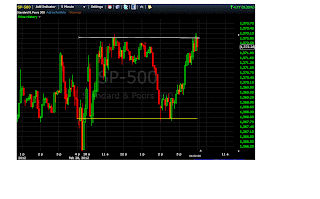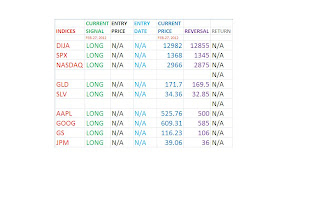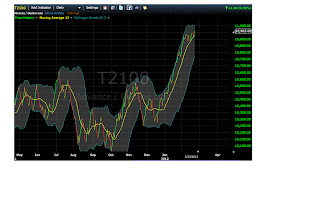Headline: The Fed just forced mortgage servicers that got caught submitting "documents that were not properly notarized," among other sins, to cough up money towards principal reduction, for people unaffected by the notarization scandal, as well as to fund "nonprofit housing counseling organizations" and other policy objectives.
Deeper question: What will the Fed look like in 2025? How long can it stay independent as it takes on more and more power, and uses that power for these kinds of political policy actions?
Act 1: Three recent news items add up to a scary picture.
Item 1: Led by the White House, the state Attorneys General announced their "settlement" with banks.
Here's what happened. Suzie, Bob, and Joe each bought $300,000 houses, that are now worth $200,000. Suzie stopped paying, and was foreclosed. Bob borrowed $280,000, so he's "underwater," but he likes his house, doesn't want to ruin his credit, and is still paying his mortgage. Joe only borrowed $200,000 and is also still paying.
The banks got caught robo-signing Suzie's paper work. The Administration and Attorneys General (with the laudable exception of Oklahoma) used the threat of prosecution to get the banks to lower Bob's principal by $20,000. Suzie might get a small check. Joe gets nothing.
There is a story for doing this. Bob might decide to stop paying his mortgage, forcing the bank to foreclose. The foreclosure might lower the value of his neighbor's property.
There are also costs. This money comes from somewhere -- the mortgage investors, the bank equity holders, or eventually the taxpayers. Maybe they had better things to do with $20,000. Maybe banks and investors, seeing their contracts torn up ex-post by the government, are going to be a whole lot more careful about who they lend to in the future. We live in a time of 3.5% mortgages that nobody can seem to get. To say nothing of the blatant unfairness, and moral hazard, of giving Bob this little present for taking out a huge loan, or the larger moral hazard of using the threat of prosecution for procedural errors to force anyone to cough up money towards unrelated policy goals.
As you can guess, I think it's a rotten idea. The Fed's own
White Paper on Housing puts the ineffectiveness of the policy and its costs better than I can, citing the relevant research. Look at the top of p. 21.
But that's not important here. Even if you think it was a great idea, you have to admit it is a controversial policy, one on which there is likely a strong partisan divide. You also have to admit that the Administration threatened the banks with prosecutions to force them to finance a policy goal having nothing to do with the actual legal case.
Ok, that's the kind of tough hardball that the executive branch plays. Which is why, in our society, they have to face the voters.
Item 2: The Federal Reserve thinks foreclosures and underwater mortgages are a big problem too, and has been cheering the Administration's various mortgage-modification programs. See
Governor Elizabeth Duke's Speech on September 1, or
Ben Bernanke speech on February 10, titled "Rebalancing the Housing Market" -- a new job for the Fed -- or the Fed's extensive
White Paper on Housing. (Actually, reading this stuff, the Fed seems much more keen on "government-facilitated rent-to-own programs," but that's an intervention for another day.)
Item 3: In case you missed it, the Federal Reserve is taking on regulation of financial institutions at a very detailed level. I reviewed its
massive plan to regulate large banks in an
earlier oped and blog post The Fed just
announced its plans to actually go forward and "designate" non-banks as "systemically important" and subject to its mercies as well. Together with the new "Consumer Financial Protection" bureau, located in the Fed, the Fed can and will tell large banks what to do at an amazingly detailed level.
Let's put two and two together. How long will it be until the Fed starts acting like the Administration. "Nice bank you have there. Wouldn't want anything to happen to it. Those consumer financial protection nerds can be a real pain in the butt, can't they? To say nothing of those wonks down in the systemic risk department. Say, we notice you're still sitting on a lot of reserves, and nobody's lending to support the housing market in Detroit. Sure would be nice if you pitched in and helped a bit. And why aren't you writing down mortgages instead of foreclosing on all those houses?"
I don't mean to ascribe any bad motives here. The people I know at the Fed are all well-meaning and really smart. The problem is the power. If you really believe that "the market is not functioning as it should." (Elizabeth Duke, Sept 1), i.e. that the housing markets are impeding recovery, and that banks could do a lot about it; if your institutional mandate includes micromanaging the state of the economy by watching individual markets, and detailed regulation of bank's activities, the outcome is inevitable: You will soon be using your regulatory power to force the banks to accomplish policy goals.
Act 2: It's already happeningAs I was writing this, I thought I was writing one of my usual doom-and-gloom worries about the far-off future. Browsing the Fed's website, it turns out
it's already happening. For the Fed is a party to the Administration's deal, and is using its banking supervision powers to force mortgage reductions.
The Fed announced its actions in a
February 9 press release The Federal Reserve Board ...has reached an agreement in principle with five banking organizations regarding the issuance of monetary sanctions against the organizations totaling $766.5 million. The monetary sanctions would be assessed for unsafe and unsound processes and practices in residential mortgage loans servicing and foreclosure processing.
... the Board is acting in conjunction with a comprehensive settlement agreed in principle between the five banking organizations, the state Attorneys General, and the Department of Justice on February 9, 2012 ("Settlement Agreement"). The Settlement Agreement requires these organizations to provide $25 billion in payments and other designated types of monetary assistance and remediation to residential mortgage borrowers.
It's right there in print:
1) The Fed is using its banking supervision powers, to call the robosigning scandals "unsafe and unsound" banking practices.
2) The Fed is acting in conjunction with the Administration -- so much for independence and standing outside of politics.
3) The Fed is forcing the banks to write down mortgages and provide other "assistance," policy goals unrelated to the actual "unsound processes and practices."
The details, in the followup Feburary 13
press release are even more astonishing. Reading from the
Ally Financial settlement,
WHEREAS, the Mortgage Servicing Companies [Ally Financial Subsidiaries], ... allegedly:
(a) Filed or caused to be filed...numerous affidavits.. making various assertions, such as the ownership of the mortgage note and mortgage, the amount of principal and interest due, and the fees and expenses chargeable to the borrower, in which the affiant represented that the assertions in the affidavit were made based on personal knowledge or based on a review by the affiant of the relevant books and records, when, in many cases, they were not based on such knowledge or review;
(b) Filed or caused to be filed in courts... numerous affidavits and other mortgage-related documents that were not properly notarized,..
(c) Litigated foreclosure and bankruptcy proceedings... without always confirming that documentation of ownership was in order at the appropriate time, including confirming that the promissory note and mortgage document were properly endorsed or assigned and, if necessary, in the possession of the appropriate party...
Heavens, what a scandal...Documents not properly notarized! Notice it does not even "allege" that anyone was actually kicked out of a house who was paying their mortgage.
WHEREAS, as part of the Settlement Agreement the Ally Parties agreed to provide consumer relief, which may include mortgage principal reductions or refinancing, and other assistance to certain residential mortgage borrowers (the “Borrower Assistance”)
NOW, THEREFORE, ..and solely for the purpose of settling this matter without a formal proceeding being filed and without the necessity for protracted or extended hearings or testimony, it is hereby ORDERED by the Board of Governors,... that:
1. Ally Financial, ResCap, and the Mortgage Servicing Companies are hereby jointly and severally assessed a CMP [civil monetary penalty] in the amount of $207,000,000...
2. ...the Board of Governors shall remit up to $207,000,000 of the CMP by an amount equivalent to the aggregate dollar value of the Borrower Assistance provided....
3. .. the Board of Governors shall also remit up to $207,000,000 of the CMP... by an amount equivalent to the aggregate amount funds expended by Ally Financial, ResCap, and the Mortgage Servicing Companies on funding for nonprofit housing counseling organizations, approved by the U.S. Department of Housing and Urban Development, to provide counseling to borrowers who are at risk of or are in default or foreclosure, or to provide assistance to borrowers in connection with the independent foreclosure reviews required by the Consent Order...
Again, right there in print:
1) Ally is to provide "relief" to borrowers, not victims of the lack of notarization.
2) They're doing it to avoid the threat of huge legal bills.
3) Legally, the Fed can't tell Ally to write people checks. So, the Fed is going to levy a $207 million penalty because Ally's lack of notarization is an "unsafe and unsound" practice. Then the Fed will "reduce the penalty" by exactly the amount that Ally spends on "borrower assistance."
4) It's not just writedowns, but all the hilarious stuff in the last paragraph -- "funding for nonprofit housing counseling organizations!" Stuff that the Administration wouldn't dare put in a budget it sent to Congress.
It's a bit puzzling that the Fed signed on to this agreement, actually. As above, the White Paper on Housing and Fed official's speeches are pretty negative on mortgage writedowns. One sniffs a lot of pressure coming form the White House.
Which is the danger, for the Fed, of getting involved in these policies at all: Who knows what great ideas the Santorum Administration will have for the Fed to "support manufacturing," or the Romney Administration will have for its idiotic "day 1" currency war with China? Now we know what the Fed is, it is only a matter of the price. It would be have been far better for the Fed to say, "as the price of our independence, we're not allowed to do things like this."
Act 3: IndependenceThe Fed is set up to be politically independent, and central bank independence is a cherished principle of monetary economists.
Academics typically think the Fed's main job is to control short-term interest rates: too high and we get unemployment, too low and we get inflation. Fed "independence" helps it to make this decision without too much political interference. Such interference might skew the decision to temporary stimulus at the expense of long-term inflation.
Before the financial crisis, thinking around the world was moving towards the idea that the central bank's job is really just to control inflation. Efforts to micromanage the economy were largely seen as illusory. This view was embodied in the ECB's mandate and many "inflation-targeting" regimes. The whole banking supervision part of the Fed was a separate backwater, unrelated to the Fed's macroeconomic policy roles.
That all seems so quaint now. The Fed is now the Gargantuan Financial Regulator, as well as Controller and Stimulator of the Macroeconomy. Its macroeconomic role is increasingly the Supporter of Particular Markets and the Allocator of Credit. It's also getting in to the business of running whole markets, i.e. the details of how mortgages are written and serviced. And it's loudly cheering for particular Administration policies such as mortgage modifications. Monetary policy is way down the list.
The price of independence is limited power. Central banks that only try to control inflation, and only using one tool, such as purchases and sales of Treasury debt, can be walled off from the political process. As a country, we can decide that the price level will not be used for political purposes and assign its maintenance to technocrats.
The Fed was assigned great power after the financial crisis. It's more competent than most of the other agencies, and as a result of its historic independence can act with great power. But this situation cannot last. The Federal Reserve cannot command that one group of voters cough up $20,000 checks to another group of voters, and not expect those voters to want a say in the matter. Locating financial regulation in the Fed may turn out to have been a terrible idea.
What to do? Good question. My preferred answer would be to save the independence, competence, and a-political nature of the Federal Reserve. That means breaking up its functions. Focus monetary policy on the price level, and stop pretending to micromanage activity. In any case, separate monetary policy from financial regulation -- break the institution up so that financial regulation
tools cannot be used to promote macroeconomic policy
goals, except by direct political intervention, by politically accountable officials.
The alternative is to bring the whole of the Federal Reserve's activities under much more direct control and accountability to elected officials. I have no more faith in the wisdom of elected officials than the next person, so I foresee a politicized Fed will be disastrous. But our society is not built on faith in the wisdom of an unaccountable aristocracy with huge power and no supervision. That will be even more disastrous. That's where the Fed is going, and it cannot last.


































